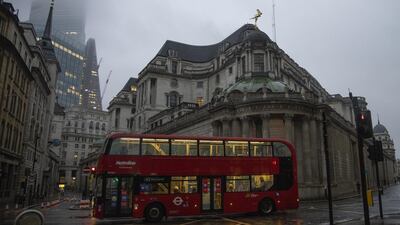Britain’s mortgage approvals remained "robust" in January despite the property sector expecting finance minister Rishi Sunak’s property tax break to expire soon, according to Bank of England data.
UK lenders approved 98,994 home loans in January, down about 4,000 from the 102,809 seen in December, with some buyers fearing their transaction would not complete before the stamp duty land tax (SDLT) break ends on March 31.
However, Mr Sunak is expected to extend the tax perk until the end of June at Wednesday's budget to prevent the sector from grinding to a halt just as the country's economic recovery begins.
The BoE said mortgage borrowing were “robust” in January as effective interest rates on new mortgage borrowing fell to 1.85 per cent.
“The mortgage market remained relatively strong in January. Individuals borrowed an additional £5.2billion secured on their homes, compared to the monthly average of £4bn in the six months to February,” the BoE said in its Money and Credit Report on Monday.
Separately, consumer borrowing fell 8.9 per cent to £2.4 billion ($3.34bn) in January compared with the same month last year - its fastest fall since May's £4.6bn drop – after England went into its third lockdown and the rest of the country faced tightened restrictions.
The BoE’s credit data also showed consumers repaid £2.39bn of personal debt in January, almost all of it amassed on credit cards. The reduction was the most since May, as the tightened movement restrictions also led to households depositing a further £18.5bn in their bank accounts.
"This is over three times the average net amount put into deposit accounts before the pandemic, which stood at £4.8bn in the six months to February 2020," said Josie Dent, managing economist at the Centre for Economics and Business Research.
Mr Sunak unveiled the SDLT break in July to bolster the property market as Britain grappled with the effects of the Covid-19 crisis.
Under the tax holiday, the first £500,000 of the purchase price of a main residence in England and Northern Ireland is exempt from SDLT, with the move causing a surge in transactions that sent house prices soaring to an average record high of £252,000 in 2020 – up 8.5 per cent from 2019.

Now Mr Sunak will reportedly use the March 3 budget to move the tax break to June 30 to bolster the market as the country recovers from the economic fallout of the Covid-19 crisis.
He is also is expected to unveil a mortgage guarantee scheme that aims to help first-time buyers get a foot on the property ladder, encouraging lenders to provide mortgages to people with deposits as low as 5 per cent on properties worth up to £600,000. The government will then offer lenders the guarantee they need to provide mortgages covering the remaining 95 per cent.
Ruth Gregory, UK economist at Capital Economics, said property sector approvals in January were 35 per cent above their pre-crisis level, with Prime Minister Boris Johnson’s lifting of coronavirus restrictions set to inject new vigour into the sector.
“A probable extension in Wednesday’s budget of the stamp duty holiday from end-March to end-June will keep approvals elevated in the second quarter,” Ms Gregory said.
Meanwhile, British manufacturers recorded the slowest output growth since May in February, as supply-chain challenges and rising costs linked to Brexit and the pandemic limited the ability to respond to a modest rise in demand.
While the output component of the IHS Markit/CIPS manufacturing Purchasing Managers' Index fell to 50.5 in February from 50.7 in January, its lowest since last May, the broader manufacturing PMI rose to a two-month high of 55.1 from January's 54.1.
"Companies reported improved demand from several markets ... but noted that the ongoing impact of Covid-19, Brexit complications and shipping difficulties also constrained export order growth," IHS Markit said


